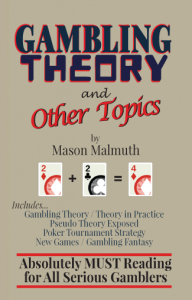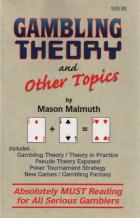Gambling Theory and Other Topics
Contents:
If no one has yet opened, he will open; If someone already has opened, he will call. Notice that this is a self-weighting strategy. In other words, there is very little difference in how this hand is played.
Even though he does not play as many hands as his self-weighting counterpart, the expert still puts about the same amount of money in the pot. To understand this, let's take a closer look at poker. He is an avid poker and blackjack player. Fernando Casamada rated it really liked it Apr 01, This and many other things will be found among the six parts of the book consisting in almost articles.
Also notice that self-weighting players are very predictable opponents, and very predictable opponents are the easiest to beat. This is true in all forms of poker. Now what about the expert high draw player?

How does he play a pair of aces? Well most of the time he will open when he is in an early position, but not all the time, especially if his other cards are small.
- Put It In Your Act!.
- Review of Malmuth's Gambling Theory and Other Topics.
- Working on Yourself Doesnt Work: The 3 Simple Ideas That Will Instantaneously Transform Your Life.
- Hypocrisy Unmasked: Dissociation, Shame, and the Ethics of Inauthenticity (New Imago)!
The small cards maximize the chances that someone else will be able to open the pot. If someone else already has opened, the expert will call most of the time, but not all the time. If his opponent has opened very late, where most players are likely to play any minimum opener, such as a pair of jacks, he will raise. If a tight player opens early, the expert knows that he is 1 up against a quality hand and 2 less likely to be against a pair of aces, since the two aces in his hand reduce the chances that his opponent is also holding a pair of aces by 70 percent.
Not 40 percent as many people think. This is because there are 10 ways you can pick two aces out of five, while there are only three ways you can pick two aces out of three. Consequently, there is a good chance the opener has a pair of aces badly beat. The expert player would throw his hand away in this situation, especially if several players still remain to act behind him.
It should be obvious from this example that the expert player is following a non-self-weighting strategy. Even though he does not play as many hands as his self-weighting counterpart, the expert still puts about the same amount of money in the pot. That is because he gets full value for some of the hands he plays, while his typical self-weighting opponent does not.
See a Problem?
By the way, it doesn't matter what kind of poker game it is. The expert players, who consistently take home the money, all follow non-self-weighting strategies. One claim I've made is that the low-limit jackpot games in California can easily be beaten. Most people believe just the opposite, simply because the house takes a lot of money out of the pot to pay not only for the game, but for the jackpot as well. For those readers unfamiliar with jackpot poker, a player wins the jackpot when he has a powerful hand beaten such as aces full or better in high draw or a six-four lowball.
The jackpots have a unique effect on almost all players, turning them into self-weighting opponents.
What happens is that typical players now have an incentive to play many more hands. Also, they don't want to make marginal value bets and raises -- where the real money is won in limit games -- simply because they are more interested in survival and shooting for the jackpot. Remember, the more self-weighting your opponent is, the poorer he plays. An extension of this is that the more self-weighting opponents you have, the easier a game is to beat.
As we have seen, in the typical jackpot game, almost everyone follows self-weighting strategies. This is why I agure that an expert player, who follows non-self-weighting strategies, can easily beat these games. The drop and the rake should be a small price to pay for the privilege of going home a winner. Summarizing, we see that in games with a jackpot, there are non-self-weighting strategies available that allow the expert player to compete with a positive expectation. The non-self-weighting player waits until he has the best of it and then takes maximum advantage of the situation.
That is, he will make as big a bet as possible and take advantage of a very small edge if that is all the edge he has. However, even though you have the best of it, this doesn't mean that you are going to win.
Gambling Theory and Other Topics by Mason Malmuth is absolutely must reading for all serious gamblers. Excerpt from the Book Gambling Theory and Other Topics: Non-Self-Weighting Strategies. This includes poker, blackjack, sports betting, and progressive slot machines, just to name. Gambling Theory and Other Topics and millions of other books are available for Amazon Kindle. Gambling Theory and Other Topics Paperback – June 1, This item:Gambling Theory and Other Topics by Mason Malmuth Paperback $
In addition, following a non-self-weighting strategy has the statistical effect of decreasing the overall sample size. Gambling Theory and Other Topics. Absolutely must reading for all serious gamblers. What helps these few to make decisions that devastate their opponents?
Gambling Theory and Other Topics
And what do you need to do to become successful at this extremely challenging occupation? This text attempts to answer these questions. You will be introduced to the dynamic concept of non-self-weighting strategies and shown how these strategies apply not only at the "very exciting gaming tables" but in real life as well. In addition, risk and fluctuations are discussed in terms of the standard deviation and their relationship to each other and to your bankroll. Some of the other topics addressed are bankroll requirements, win-rate accuracy, free bets, which blackjack count is best, lottery fallacies, dangerous ideas, poker tournament strategies including when it is correct to rebuy , settling up in tournaments, pai gow poker, super pan nine, the world's greatest gamblers, and building pyramids.

How Much Do You Need? Moving Up and Down. Computing Your Standard Deviation.
- Practical Psychoanalysis for Therapists and Patients
- The Secret Chef: 40 easy and delicious recipes you can make right now!
- Globalizing Education for Work: Comparative Perspectives on Gender and the New Economy (Sociocultura
- Adiestra a tu pequeño gato salvaje (Spanish Edition)
- Vamps and the City (Love at Stake, Book 2)